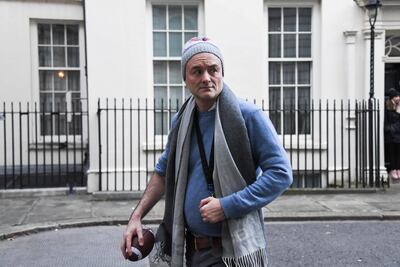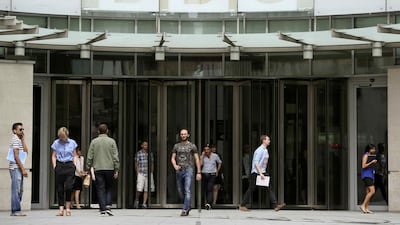There are few international media brands better known than the BBC with its wide range of output from news to costume dramas and car shows. Yet this British institution is very much a prophet without honour in its own land, and last year's general election presages the beginning of its end in its current form.
This is not an argument about whether the BBC's programming is good or bad. Its place in the first rank of producers is not the issue, nor is its ability to appeal to audiences worldwide. In fact, the soft power aspect embodied in its World Service section – and its motto "Nation shall speak peace unto nation" – barely figures in this calculus.
Instead, it is the BBC’s outsized role in British life that makes it vulnerable to a wholesale repudiation of its status.
Political considerations now point to its demise. The Brexit campaigners, who achieved the seemingly impossible in 2016 by winning a referendum to take the UK out of the European Union, have now put the BBC on notice.
With the date for EU departure set firm for Friday night, the next installment of the British national drama is set to be played out over the fate of the broadcaster. After all, taking down mighty and imperious institutions would be another popular project.
Charges that were laid against the European Commission and other bodies in Brussels have now been recycled with additional venom against the BBC.
The first is that it is accountable to nobody. This allows almost any failing to become a burden on the broadcaster as a whole. Management has been at pains to set up all manner of mechanisms to hold itself to account but in reality, it can never shed the tag of self-interest in its own regulation.
The second accusation is that the BBC is the cornerstone of a liberal, metropolitan elite. Here, the history of denigration of the EU in British minds is instructive. As far back as 1990, a hit comedy series titled The Gravy Train set in stone the image of overpaid, over-powerful Eurocrats taking decisions by fiat that affected tens of millions. The same has already happened with the BBC across many arguments over executive and "talent" pay.
The BBC itself broadcast W1A, a television series that expertly exposed the management by florid jargon and committee that afflicts the corporation. Ranks of BBC executives – and those that appear on television – have been etched into the public mind as the epitome of a liberal, city-dwelling perma-class.
To its critics, most of whom are the same voices that campaigned for Brexit, the BBC is not only a tainted force in news but its assumptions permeate through the drama, current affairs, panel shows and even the sports programmes that it broadcasts. In other words, there is a great wall of sound brought to bear in support of the elite consensus throughout the BBC's output.
Money plays an important supporting role in this drama. In 2010, the Conservative-Liberal Democrat coalition government cut funds worth hundreds of millions of pounds that the BBC spent annually on the World Service. A concession of free annual licences for the elderly was also heaped on the institution.

The licence is key because within Britain the broadcaster does not run advertisements. It has revenues from royalties and other commercial operations but these are peripheral.
Technological advances pose massive challenges to the stream of licence income. Consumers increasingly do not use programming for entertainment. Many do not bother with televisions, which the licence taxes by law. Add to that, the ability of the state to curtail the licence fee income has already seen some shrinkage of the corporation.
The curtailment of universality is an important breach as it suggests that more cutbacks can be made. But particular battles over finances are a sideshow. Attacks aimed at the BBC are, at root, a battle over how to guide the destiny of the nation.
Prime Minister Boris Johnson’s most important adviser Dominic Cummings has for decades paired the EU and the BBC as equivalent Leviathans.
New Frontiers Foundation, a think tank that Mr Cummings helped run, made its charges against the BBC more than 15 years ago. It made clear that the Conservative Party was in competition with the organisation to be the pre-eminent player in how the UK is run. “The BBC is dominated by a culture that regards differing points of view as immoral. In their worldview, having certain views = immoral = more or less racist,” the NFF said.
As the same document recommended, Mr Cummings has banned cabinet ministers from appearing in the leading morning radio news, something unthinkable for at least five political generations.
Another Conservative commentator last week said that Mr Johnson must face down the “left-liberal, anti-democratic” BBC by decriminalising licence fee non-payment, launching anti-monopoly inquiries into how products like its news website crowd out competitors, and imposing outside regulation.
That is just the starting menu for a wholesale feast on a much loved broadcaster.
Damien McElroy is the London bureau chief of The National


